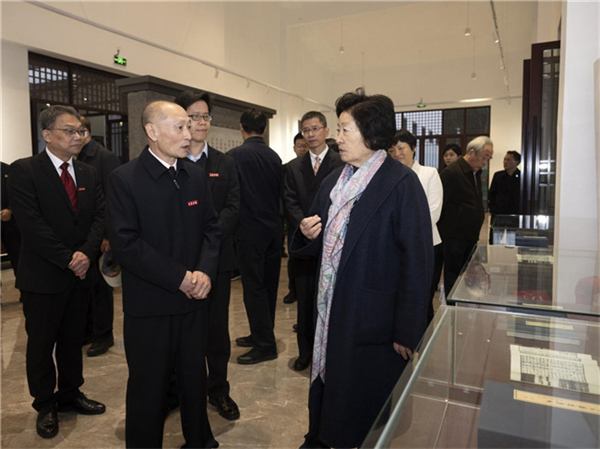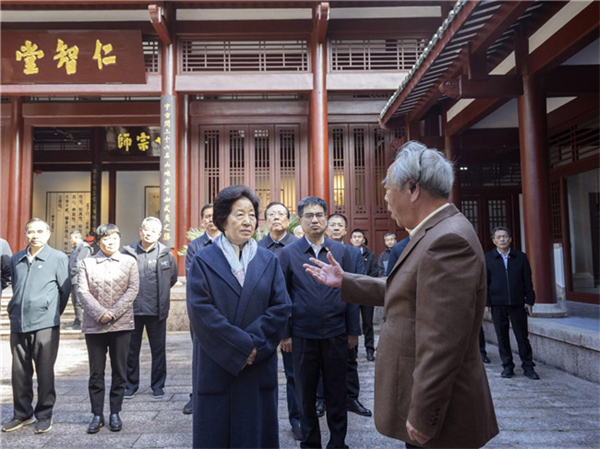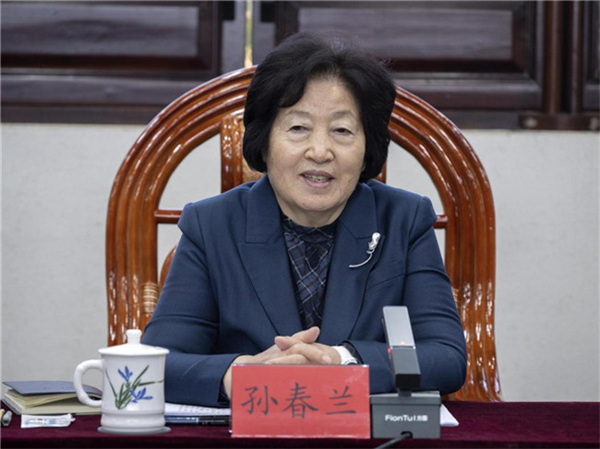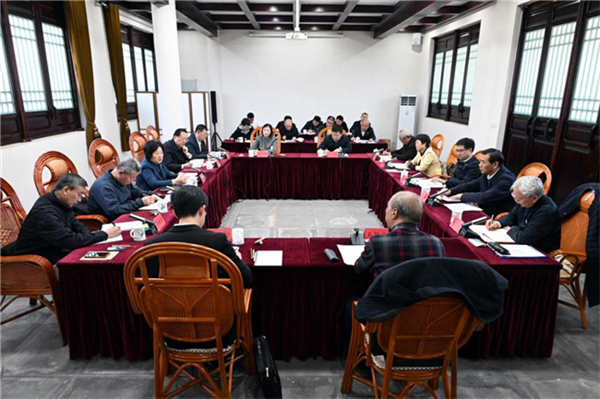

Sun Chunlan, president of the International Confucian Association (ICA), conducted a survey on the inheritance and development of culture related to Zhu Xi, an eminent thinker, philosopher, educator and a Neo-Confucian master in ancient China, in Nanping, East China's Fujian province, from Nov 29 to Dec 1. During her visit, Sun gained a detailed understanding of Nanping's practices in protecting and exploring traditional cultural resources and effectively vitalizing fine traditional culture. She also chaired a symposium on the inheritance and development of Zhu Xi culture.
Hao Ping, executive vice-president of the ICA; Zhao Yiwu, vice-council chair of the ICA; Ma Jianfei, secretary-general of the ICA; Xu Yongji, deputy secretary-general of the ICA; Lin Wenbin, a member of the Standing Committee and head of the United Front Work Department of the CPC Fujian Provincial Committee; Yuan Chaohong, secretary of the CPC Nanping Municipal Committee; and Lin Bin, chairman of the Nanping Municipal Committee of the Chinese People's Political Consultative Conference, accompanied Sun on her visit.

Nanping holds significant historical importance as it witnessed the origin, development and flourishment of Zhu Xi's Neo-Confucian theories. Sun and her delegation visited the Song-Ming Neo-Confucianism Research Center in the city, where they received a detailed briefing on the center's academic activities, cultural exchanges and research achievements.
Highlighting the center's collaboration with the Institute of Philosophy of the Chinese Academy of Social Sciences and Fujian Academy of Social Sciences, Sun called on the center to intensify the research, interpretation, inheritance and promotion of Zhu Xi culture, promote international cultural exchanges and mutual learning among civilizations, further explore the contemporary value of Zhu Xi culture, and promote more high-quality research outcomes.
The delegation also visited a park dedicated to Zhu Xi, which contains a thematic memorial hall showcasing Zhu Xi's life, Neo-Confucian theories and educational philosophy. Gaining a detailed understanding of Zhu Xi's life, the origin of Neo-Confucianism and related research, Sun emphasized the importance of upholding fundamental principles and breaking new ground, integrating the basic tenets of Marxism with China's specific realities and fine traditional culture, and better shouldering new cultural missions.
During her visit to Wufu town, Wuyishan city, Sun traveled to several historical sites related to Zhu Xi, learning about the locality's efforts to protect and utilize Zhu Xi's cultural legacies. She stressed the need to promote the integration of these cultural legacies with school education, and cultivate talents with core socialist values.
Efforts should be made to protect and develop historical and cultural towns, diversify their functions and business models, and promote the integrated development of culture and tourism, Sun added.

Sun learned about the formation and development of Zhu Xi's Neo-Confucianism during her visits to Hanquan Academy and Kaoting Academy in Nanping's Jianyang district.
At a symposium at Kaoting Academy, Sun highlighted the fruitful efforts by Fujian and Nanping in promoting the creative transformation and innovative development of Zhu Xi culture, urging Nanping to seize the opportunity to continue its efforts to promote Zhu Xi culture as an internationally recognized cultural brand.

Emphasizing the importance of advancing sustained efforts to strengthen cultural education, enhance cultural influence, and showcase a new image of Fujian, Sun called for strengthening research and interpretation on Zhu Xi culture, building academic platforms, and hosting the Kaoting Forum at a high level. Efforts should be intensified in the popularization of Zhu Xi culture, the preservation of Zhu Xi's cultural legacy, and the expansion of channels for its dissemination, she added.
Sun underscored the need to strengthen the cultivation of talents in the studies of Zhu Xi culture, establish talent training bases through collaboration with universities, support young and middle-aged scholars in their studies of Zhu Xi culture, and cultivate a group of key academics and leading figures in this field.
In addition, Sun emphasized the importance of continuing to strengthen international academic exchanges, translating classic works of Zhu Xi, deepening friendly exchanges with key groups such as young people from home and abroad, and promoting the formation of a world-class Zhu Xi cultural identity.
Proposing utilizing Zhu Xi culture as a bond to deepen cultural exchanges and promote integrated development across the Taiwan Strait, Sun said the ICA will fully leverage its strengths in academia, talent and internationalization to continuously deepen cooperation with Nanping, and actively support the inheritance and development of Zhu Xi culture.


